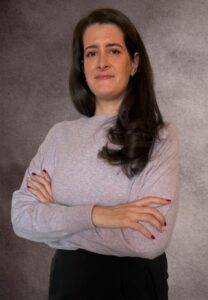
When OneTable’s first-ever chief technology officer, Amalia Kruszel of Arlington, works to enhance peoples’ connections to Shabbat, she can often be found hanging out with her dog. Last month, OneTable announced Kruszel’s promotion to the newly created position. Before taking on her new role, Kruszel worked at OneTable for four years.
What did your life look like before OneTable?
I studied at George Washington University for undergrad. I realized I liked technology, and I wanted to incorporate technology with business, so I got my MBA at George Mason while working full-time. I started my career at a time when organizations didn’t have CRMs [Customer Relationship Management systems]. And I sort of led a lot of projects at different organizations to implement different kinds of CRMs. At my previous role, I not only managed our integration to the CRM, but also fundraising, event planning and membership management. It’s been a career of finding solutions for technical problems … I’m most interested in making the user experience better.
What are your responsibilities as the first chief technology officer at OneTable?
I essentially manage all of the technology at OneTable, which is our platform. I manage anything related to the strategy around technology and then also all of our internal services and our data sources.
What is special about OneTable’s culture?
I feel like we [OneTable] have one of the best nonprofit cultures that I’ve ever worked in. We put our users above anything else. We put our mission at the forefront, and everybody at the organization is committed to that same mission of supporting users and building a Shabbat practice. So, there’s a real connectedness from everybody at the organization to fulfill the same goal. And that’s been nice.
What do you like most about working for a nonprofit organization?
The culture within nonprofit organizations is often different than when working for a for-profit company. That spoke to me; I’ve always worked at organizations that spoke to me on a personal level. With OneTable and our mission towards building a Shabbat practice, that’s also been very personal to me.
Why is Shabbat so important to you?
I grew up having Shabbat as a kid living at home. My mother always made it important that Friday night was Shabbat time. When I became an adult and moved to D.C., I wasn’t connected to that practice. Incorporating Shabbat into my life felt like a natural way of meeting new people and making friends in the city again.
Can you provide a quick summary of how OneTable works?
We always say that we use a peer-to-peer engagement model. We have a whole host of field managers in particular cities who facilitate relationships with hosts and guests to help them use our platform to build a Shabbat practice. So, it’s both the technology and being able to put your dinner on the platform and invite your guests on the platform. You can always also open your table to new people. We have our field managers supporting you in that journey and we also offer nourishment to help elevate your Shabbat dinner in the form of gift cards for restaurants or groceries so that you can help support a practice that you may not have had otherwise.
What are some of your goals in this new position as chief technology officer?
The ultimate goal for me is to make the experience of hosting or joining a Shabbat table more delightful and easier. I see my role as integral to meeting our strategic goals as an organization, which means how are we helping you build that practice and deepen the experience with
Shabbat?
What are some of the achievements you have led at OneTable?
At OneTable, we’re reaching about a million seats nourished total. Being able to meet those numbers could only have been done through technology over the last four years, particularly during the pandemic. We grew exponentially because of the shifts we were able to make on the platform itself. Internally, we’re making a lot of efficiencies within the organization to support more dinners than ever.
What do you derive joy from in your job?
I get a lot of joy from when we are able to make things better and better. We are not a stagnant organization – we are constantly iterating and trying to figure out how to do things better, more efficiently or more delightful to the participants … We also listen to feedback that we were getting from users and implement it in real-time. We’re a very data driven organization, which informs a lot of the decisions that we make, and that’s what’s so exciting to me.





